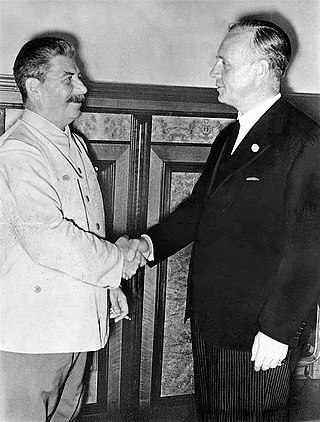
The Molotov–Ribbentrop Pact, officially the Treaty of Non-Aggression between Germany and the Union of Soviet Socialist Republics, was a non-aggression pact between Nazi Germany and the Soviet Union with a secret protocol that partitioned Central and Eastern Europe between them. The pact was signed in Moscow on 23 August 1939 by German Foreign Minister Joachim von Ribbentrop and Soviet Foreign Minister Vyacheslav Molotov. Unofficially, it has also been referred to as the Hitler–Stalin Pact, Nazi–Soviet Pact, or Nazi–Soviet Alliance.
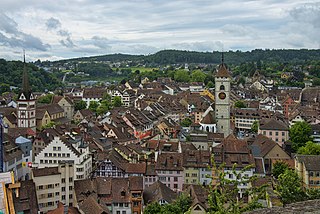
Schaffhausen, historically known in English as Shaffhouse, is a town with historic roots, a municipality in northern Switzerland, and the capital of the canton of the same name; it has an estimated population of 36,000 as of December 2016. It is located right next to the shore of the High Rhine; it is one of four Swiss towns located on the northern side of the Rhine, along with Neuhausen am Rheinfall, the historic Neunkirch, and medieval Stein am Rhein.
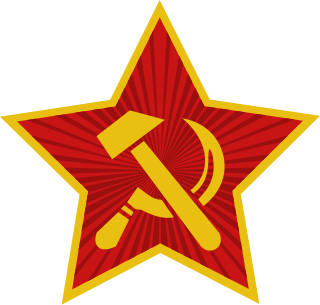
The Communist Party of Germany was a major far-left political party in the Weimar Republic during the interwar period, an underground resistance movement in Nazi Germany, and a minor party in West Germany during the postwar period until it was banned by the Federal Constitutional Court in 1956.

The canton of Schaffhausen, also canton of Schaffhouse is the northernmost canton of Switzerland. The principal city and capital of the canton is Schaffhausen. The canton's territory is divided into three non-contiguous segments, where German territory reaches the Rhine. The large central part, which includes the capital, in turn separates the German exclave of Büsingen am Hochrhein from the rest of Germany.

The Anti-Comintern Pact, officially the Agreement against the Communist International was an anti-Communist pact concluded between Nazi Germany and the Empire of Japan on 25 November 1936 and was directed against the Communist International (Comintern). It was signed by German ambassador-at-large Joachim von Ribbentrop and Japanese ambassador to Germany Kintomo Mushanokōji. Italy joined in 1937, but it was legally recognised as an original signatory by the terms of its entry. Spain and Hungary joined in 1939. Other countries joined during World War II.

The Swiss Party of Labour is a communist party in Switzerland. It is associated with the European United Left–Nordic Green Left group in the European Parliament, although Switzerland is not in the EU.

The Evangelical People's Party of Switzerland, Swiss Evangelical Party, or Evangelical Party of Switzerland is a Protestant Christian-democratic political party in Switzerland, active mainly in the Cantons of Bern, Basel-Land, Basel-Stadt, Aargau and Zürich. "Evangelical" translates as evangelisch, the German term for "Protestant", as opposed to "evangelical" as used in Anglo-Saxon Christianity.

German–Soviet Union relations date to the aftermath of the First World War. The Treaty of Brest-Litovsk, dictated by Germany ended hostilities between Russia and Germany; it was signed on March 3, 1918. A few months later, the German ambassador to Moscow, Wilhelm von Mirbach, was shot dead by Russian Left Socialist-Revolutionaries in an attempt to incite a new war between Russia and Germany. The entire Soviet embassy under Adolph Joffe was deported from Germany on November 6, 1918, for their active support of the German Revolution. Karl Radek also illegally supported communist subversive activities in Weimar Germany in 1919.

Wilhelm "Willi" Münzenberg was a German Communist political activist and publisher.
Social fascism was a theory that was supported by the Communist International (Comintern) and affiliated communist parties in the early 1930s, which they used to discredit social democracy as a moderate variant of fascism because it stood in the way of a dictatorship of the proletariat and supported a shared corporatist economic model.
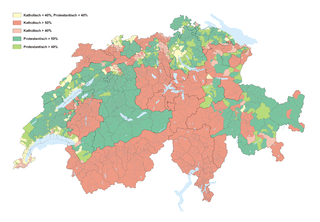
The Protestant Church in Switzerland (PCS), formerly named Federation of Swiss Protestant Churches until 31 December 2019, is a federation of 25 member churches – 24 cantonal churches and the Evangelical-Methodist Church of Switzerland. The PCS is not a church in a theological understanding, because every member is independent with their own theological and formal organisation. It serves as a legal umbrella before the federal government and represents the church in international relations. Except for the Evangelical-Methodist Church, which covers all of Switzerland, the member churches are restricted to a certain territory.

The Old Swiss Confederacy or Swiss Confederacy was a loose confederation of independent small states, initially within the Holy Roman Empire. It is the precursor of the modern state of Switzerland.
Communist Party Opposition was a Swiss communist party 1930–1935, connected to the German Communist Party Opposition. It was the Swiss affiliate to the International Communist Opposition.

German–Soviet Axis talks occurred in October and November 1940 concerning the Soviet Union's potential entry as a fourth Axis power during World War II. The negotiations, which occurred during the era of the Molotov–Ribbentrop Pact, included a two-day conference in Berlin between Soviet Foreign Minister Vyacheslav Molotov and Adolf Hitler and German Foreign Minister Joachim von Ribbentrop. The talks were followed by both countries trading written proposed agreements.
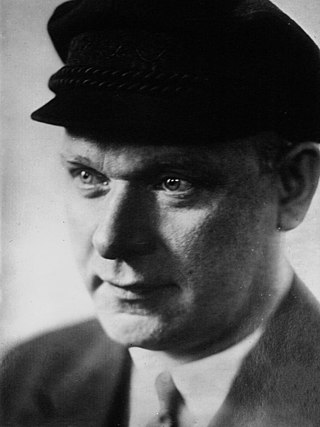
The Wittorf affair was a political scandal that occurred in the Communist Party of Germany (KPD) during the Weimar Republic in 1928. Chairman Ernst Thälmann was ousted from the KPD Central Committee when his close friend John Wittorf had embezzled from a party campaign fund and Thälmann tried to cover up the embezzlement. Joseph Stalin had Thälmann reinstated as KPD Chairman using the influence of Comintern, completing the Stalinization of the KPD and beginning a purge of moderates from the party.

Heinz Neumann was a German politician from the Communist Party (KPD) and a journalist. He was a member of the Communist International, editor in chief of the party newspaper Die Rote Fahne and a member of the Reichstag. He was one of the many victims to Stalin's Great Purge.
The Swiss Socialist Federation was a political party in Switzerland.
Jakob Lechleiter was a Swiss politician.














